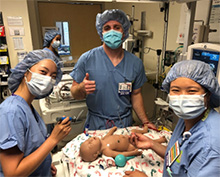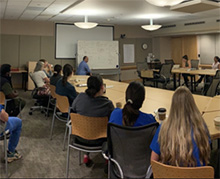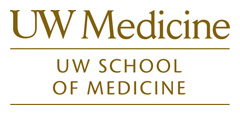Training Conferences
 Residents participate in procedural learning throughout their three years of training to practice common procedures such as splinting, suturing, PIV placement and umbilical line placement. Pictured here are residents practicing neonatal resuscitation at UW NICU.
Residents participate in procedural learning throughout their three years of training to practice common procedures such as splinting, suturing, PIV placement and umbilical line placement. Pictured here are residents practicing neonatal resuscitation at UW NICU.
Resident education is a top priority in our program, and our extensive formal learning conferences reflect our commitment to developing our residents' knowledge base.
In addition to the weekly schedule outlined below, residents attend journal club, procedural simulations and subspecialty conferences.
Morning Report
Each Wednesday morning, residents and attendings meet for an informal and interactive discussion of interesting patients in the hospital. Executive residents (previously known as chief residents) or associate executive residents facilitate case-based learning about topics ranging from interesting diagnostic mysteries to management dilemmas.
Mock Code
Once a month, residents participate in a mock code run by executive residents and ED attendings. SimBaby is used to create realistic scenarios in which residents can practice skills such as intubation, chest compressions and intraosseous line insertion while following PALS algorithms. There is also a strong focus on teamwork, division of roles and communication in the code setting.
Grand Rounds
Every Thursday morning, hospital staff and community physicians attend this lecture series of varied topics, ranging from advances in molecular research to legislative issues affecting children. This forum brings international experts in pediatric medicine, research and policy and relates their expertise to our local population. See the schedule for Grand Rounds.
Ambulatory and Inpatient Noon Conference
Each year, a core curriculum of ambulatory and inpatient topics (based on the material covered by the Pediatrics Boards Exam) are presented by general pediatric and subspecialty attendings during noon conference on Mondays, Tuesdays, Wednesdays and Fridays. This series provides a framework for approaching common pediatric diagnostic and management issues.
Journal Club
Once a month, residents get together during lunch to discuss a journal article. A resident and attending work together to select an article in the residents’ area of interest and lead a discussion to analyze the merits of the study. Residents are able to have a casual, but thoughtful conversation about study design and data analysis, while learning about new findings/perspectives in pediatric patient care.
Academic Half-Day
There are about 10 academic half-days distributed throughout R1 year. Each half-day is focused on hands-on, in-depth, foundational teaching in a core subspecialty, such as cardiology and sports medicine, or topics which require thoughtful small group discussions, such as microaggressions training and delivering bad news. All academic half-days are protected teaching time for R1s, during which attendings and senior residents cover the inpatient services.
Morbidity and Mortality (M&M)
About once a month, residents collaborate with the Seattle Children’s patient safety team on a challenging case review. In a supportive, collaborative and anonymous (if desired) environment, residents debrief about what made a case difficult, what lessons were learned and how to improve our hospital system to avoid the same errors. Residents often volunteer cases in which they were the primary provider because they want to share what they’ve learned about improving patient care. These residents are free to choose how involved or uninvolved they want to be in preparing and delivering the presentation.
Resident Capstone Presentation (RCPs)
 Morning report with one of our ID and EM double-boarded attendings leading the discussion and building a differential for an unusual case.
Morning report with one of our ID and EM double-boarded attendings leading the discussion and building a differential for an unusual case.
Each R3 is required to present a noon conference to faculty and fellow residents on a topic of their choice during their R3 year. Residents are encouraged to present on any topic that interests them, and they may receive mentoring on their presentations, if desired. Presentations have ranged from case-based talks focused on a wide variety of medical topics, to talks on resident research or advocacy work, to talks on social determinants of health, ethics or medical education. If interested, residents are also encouraged to present morning reports and noon conferences, and at patient safety conferences, especially during their associate executive resident and teaching rotations.
